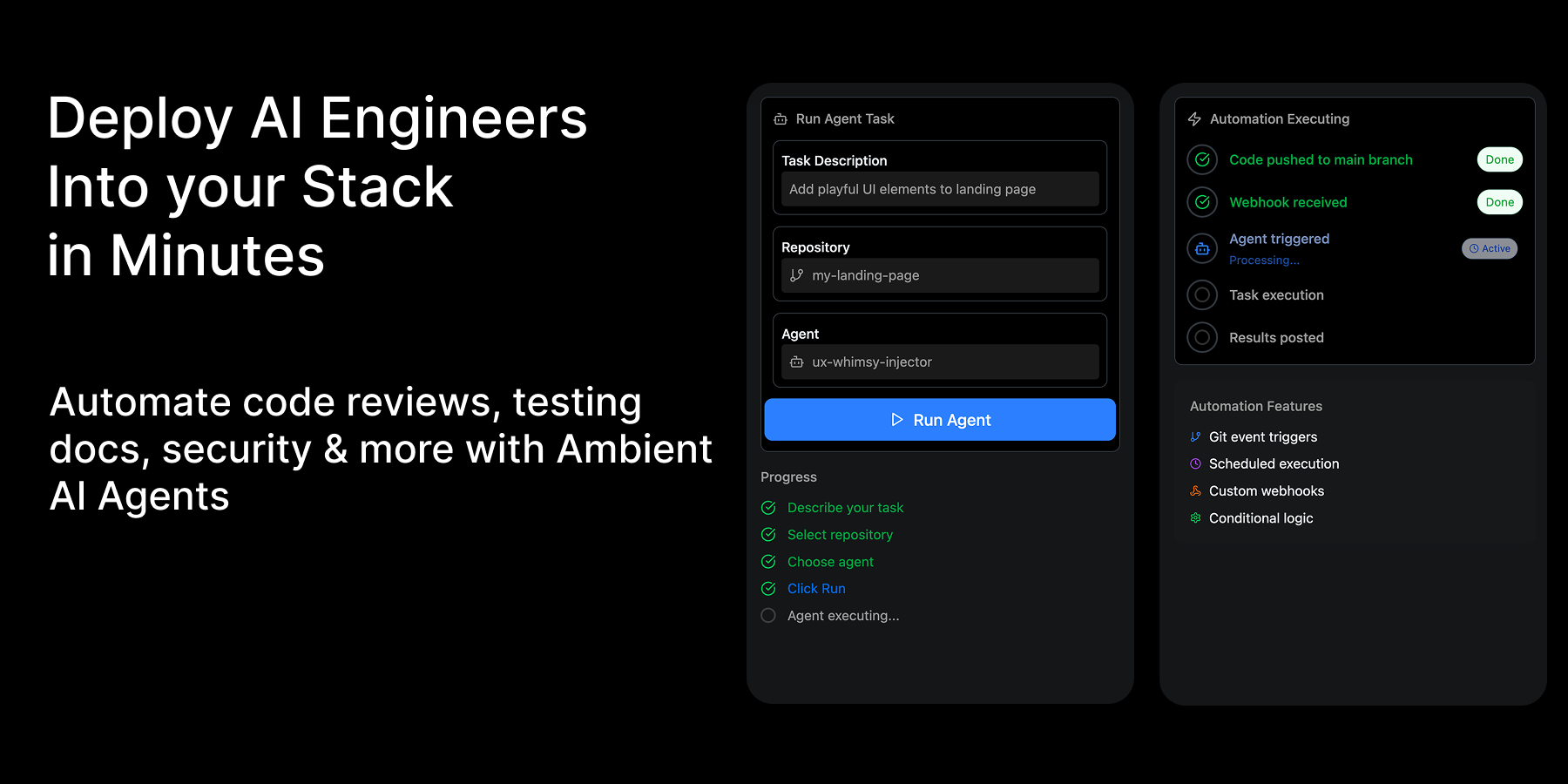
Table of Contents
Overview
In the fast-paced world of software development, efficiency and code quality are paramount. Imagine having an intelligent assistant that not only understands your codebase but also actively contributes to its improvement. This is where AI coding agents come in, and today we’re diving into a powerful tool designed to create your own coding AI agents that code smarter, review faster, and maintain automatically. This innovative solution aims to empower your engineering teams with ambient AI agents precisely tailored to your unique workflow, promising a significant leap in productivity and code health.
Key Features
This platform stands out with a robust set of features designed to integrate seamlessly into your existing development environment.
- Custom Coding Agents Aligned to Team Workflow: Tailor AI agents to understand and operate within your team’s specific coding standards, architectural patterns, and development processes.
- Automated Code Generation, Reviews, and Maintenance Tasks: Automate repetitive yet critical tasks, from generating boilerplate code to conducting thorough pull request reviews and performing routine maintenance.
- Repository/CI-Friendly Workflow Integration: Easily connect and integrate these agents with your existing code repositories and Continuous Integration pipelines, ensuring a smooth and non-disruptive workflow.
- Policy/Governance Settings for Safer Changes: Implement strict policies and governance rules to ensure that all AI-driven changes adhere to security, compliance, and quality standards, minimizing risks.
How It Works
Understanding the operational flow of these AI agents is crucial to leveraging their full potential. The process is designed to be intuitive, allowing teams to quickly set up and deploy their custom agents.
First, you define your agents, their objectives, and the necessary guardrails. This involves specifying what tasks the agents should perform such as refactoring, bug fixing, or code generation and setting clear boundaries and rules for their operations. Next, you connect these agents to your codebases and development tools, linking them to your GitHub, GitLab, or other version control systems, as well as your CI/CD pipelines. Once configured, the agents then implement changes, review pull requests, and run upkeep jobs either on a predefined schedule or on demand, seamlessly integrating into your development cycle and taking on the heavy lifting of code maintenance and improvement.
Use Cases
The versatility of these AI agents makes them suitable for a wide array of development scenarios, addressing common pain points in engineering workflows.
- PR Review Automation and Standards Enforcement: Automate the initial pass of pull request reviews, ensuring code adheres to team standards, style guides, and best practices before human reviewers even look at it.
- Tech-Debt Cleanup and Dependency Upgrades: Proactively identify and address technical debt, automatically refactoring outdated code or upgrading dependencies to keep your projects modern and secure.
- Continuous Refactoring and Code Health Maintenance: Maintain a consistently healthy codebase by scheduling agents to perform continuous refactoring, optimize performance, and improve overall code quality over time.
- Drafting Features and Boilerplate Across Services: Accelerate development by having agents draft initial feature implementations, create boilerplate code, or generate repetitive structures across multiple services, freeing up developers for more complex tasks.
Pros \& Cons
Delving into the advantages and disadvantages can help you determine if this tool is the right fit for your team.
Advantages
- Boosts Engineering Throughput: Automating routine and repetitive tasks allows engineers to focus on more complex and creative problem-solving, with research showing 35-45% productivity improvements.
- Consistent Reviews: Ensures uniform application of coding standards and best practices across all pull requests, reducing human error and subjectivity.
- Continuous Code Hygiene: Maintains a consistently clean, optimized, and up-to-date codebase through automated maintenance and refactoring.
- Adaptable to Team Processes: Highly customizable agents can be tailored to fit specific team workflows, coding styles, and project requirements.
Disadvantages
- Setup/Integration Effort: Initial configuration and integration with existing codebases and CI/CD pipelines may require a significant time investment and technical expertise.
- Requires Guardrails and Approvals: To prevent unintended consequences, robust guardrails and human approval processes are essential, adding a layer of management overhead.
- Potential for Incorrect Changes Without Strong Tests and Policies: Without comprehensive test suites and well-defined policies, there’s a risk of agents introducing errors or suboptimal code changes.
How Does It Compare?
When evaluating AI coding tools in 2025, it’s important to understand where this platform stands against its current competitors. The landscape has evolved significantly, with several advanced solutions now available including Devin AI (Cognition) offering complete autonomous software engineering, Qodo providing comprehensive SDLC coverage with purpose-built agents for generation, testing, and review, CodeRabbit delivering intelligent PR reviews with codebase learning capabilities, Cursor featuring predictive editing and natural language code manipulation, Windsurf providing agent-based IDE with real-time collaboration, Claude Code offering terminal-integrated assistance with deep codebase awareness, Microsoft AutoGen enabling multi-agent collaborative systems, and Replit Agent providing cloud-based development with integrated AI assistance.
While these tools offer valuable assistance in various aspects of development, this platform’s key differentiator lies in its focus on customizable, ambient agents that manage end-to-end code, review, and maintenance workflows. Unlike tools that primarily assist individual developers or focus on specific parts of the pipeline, this solution provides a holistic, team-oriented approach with agents that operate continuously in the background, tailored to your organization’s specific needs and integrated across your entire development stack.
Final Thoughts
This AI coding agent platform presents a compelling vision for the future of software development, offering a powerful way to enhance team productivity and code quality through intelligent automation. By enabling the creation of custom, ambient AI agents that handle everything from code generation to continuous maintenance, it allows engineering teams to focus on innovation while ensuring their codebase remains robust and healthy. While initial setup requires careful planning and the establishment of strong guardrails, the long-term benefits of boosted throughput, consistent reviews, and continuous code hygiene make it a tool worth exploring for any forward-thinking development organization. As the AI coding landscape continues to evolve rapidly, staying informed about the latest capabilities and best practices will be crucial for maximizing the value of these powerful development tools.

